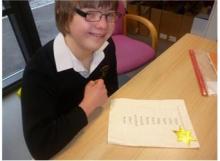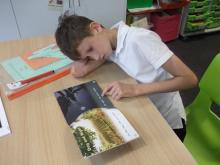
Making sense of books:
The key skill of literacy is decoding. Using all the cues available to understand the meaning of a book or other text. All pupils can benefit from simply sharing books with adults. This develops the ability to maintain joint attention, communicate and interact with the adult, learn to look carefully at what is in pictures and what they mean. Only when these skills are developing well is it most effective to begin learning to “read” the text.
Sight Vocabulary:
Confident readers very rarely have to sound out words (important though this skill is). Rather when they see a word they instantly know what word it is. This is called sight vocabulary and, when appropriate, we teach pupils to have a bank of key words that they can recognise straight away.
Phonics:
Being able to sound out letters and words is an important skill for readers. It is essential to understand the mechanics behind reading and being able to teach yourself new words to read. Pupils learn how to combine letters, check that it makes sense and maximise their ability to decode text.
Getting your message across:
The ability to write is an important form of being able to record and present information. However, the expression that “a picture paints a thousand words” shows that there are other important ways of getting your message across. Therefore pupils learn both to write to the maximum of their ability but also learn other ways to communicate in recorded form such as computer presentations and the use of pictures and symbols.


